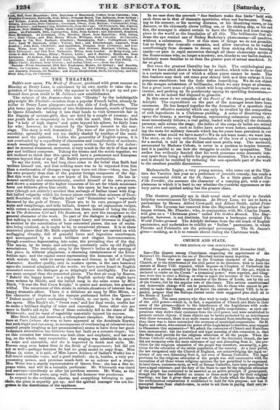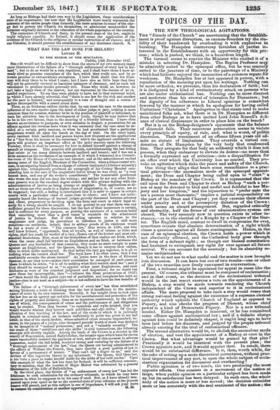CHURCH AND STATE.
TO THE EDITOR OF THE SPECTATOR.
Hampshire, 20th December 1847. Six—The dispute among Churchmen respecting the appointment of tte Reverent Dr. Hampden to the see of Hereford invites many inquiries. First. Those who are opposed to the Erastian character of the Anglican Church, or to the interference of the civil power in its direction, wish to have the statute of Henry VIII. repealed, which imposes on Chapters of Cathedrals the election of a person specified by the Crown to be a Bishop. If this act, which is declared to confer on the Crown " a tyrannical power," were repealed, and Chap- ters were free to elect a Bishop; or even to reject the nominee of the Crown, the result would be, the election of a member of the House of Lords, not by the act of the Crown, but by the popular vote of theclergy. This serious conetitutioual and democratic change will not be permitted; but do those who cannot be per- mitted to make this change, and yet desire the statute of Henry VIII. to be re- pealed, propose that the Bishops elected under their suggested plan shall sit in the House of Lords?
Secondly. The same persons who thus wish to make the Church independent of the civil power—which is, in fact, a separation of Church and State m their sense of the phrase--object to the mterference of the Legislature with eccle-
siastical revenues. revenues are held by public corporations; as such cor- porations they derive their existence from the civil power, and were established to promote certain objects: if those objects can be better promoted by an interference with those revenues, there is no more reason to abstain from interfering with them than there was to leave untouched the revenues of municipal corporations. Sir H. Inglis and others, who contest the power of the Legislature to interfere, may suggest to Dissenters this argument—" We admit the connexion of Church and State from time immemorial; but the historical and legal meaning of this connexion is, that the State shall provide for the religious education of all the people. When the Roman Catholic religion prevailed, and was that of the dominant church, the law did not recognize even the mere existence of any sect dissenting from it: the pro- vision for the religious education of thie.urple was therefore, necessarily, a pro- vision for the education of the entire population of the country. At a later period, the law recognized only the Church of ugland, not acknowledging the legal ex- istence of any sect dissenting from it not even of Roman Catholics. The legal provision for the religious education of the people was still coextensive with the necessities of all those whose religious opinions the law permitted to be expressed. In later times, numerous sects, as well as Roman Catholics, have been permitted to have a legal existence; and the duty of the State to care for the religious education of the people has continued to be asserted as an active principle of government, though the State has afforded no means to those sects to pay for their religions teaching; nor has it given them any share of the funds which the State enabled the ecclesiastical corporations it established to hold for this purpose; nor has it exempted them from chuich-rates, in order to aid them in paying their awn re- ligions teachers."
As long as Bishops had their own way in the Legislature, these considerations were of no importance; but now that the Legislature more nearly represents the interests of the entire people than formerly, the more anxious do many of the cler- gy feel to govern the Church for themselves, to administer uncontrolled the revenues originally devoted to the education of the whole population of the country. The connexion of Church and State, in the present state of the law, ought to imply religious equality. In Ireland, it should mean the application of the revenues of the Church to the religious or secular instruction of all classes; and in our Colonies, it should prevent the establishment of any dominant church. X.
























 Previous page
Previous page